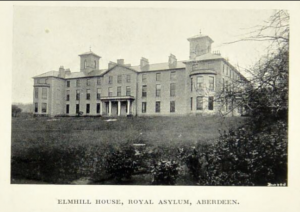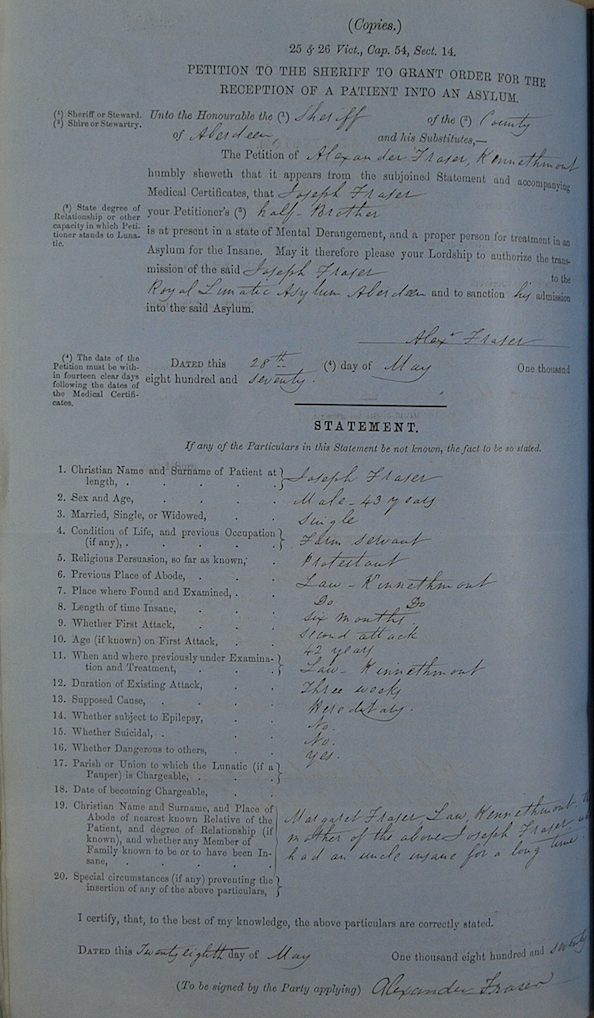I have recently uncovered some very sad information about my 4x-great-uncle Joseph Fraser. Joseph was a brother to Andrew Fraser, my 3x-great-grandfather. Andrew emigrated to the United States from Scotland in about 1855. But Joseph stayed in Scotland his entire life.
Here is quick refresher on how Joseph fits into the family tree.
Andrew’s and Joseph’s father was John Fraser. I know very little about John Fraser – I don’t know for sure when or where he was born; he is one of my “brick wall” ancestors.
John’s first wife was Harriet or Henriet Reid (I’ll call her Henriet). I don’t know anything much about her, either. But with Henriet he had three sons: Donald, Andrew (my 3x-great-grandfather) and Alexander. After Henriet died, he remarried to Margaret Beattie and had three more children: twin girls Mary and Margaret and another son Joseph.
I don’t know what happened to Donald. Andrew, of course, came to America in 1855; he married Ann Campbell and had three children. Alexander never married but was the father of Annie Susan Fraser who came to America in about 1878. I believe Alexander himself came to America later in life as well (I’m realizing I need to collect and confirm details on Alexander and Annie Susan). Margaret, one of the twins, died young. The other twin, Mary, died of tuberculosis at age 33. The youngest child of the family, Joseph, stayed in Scotland his entire life and died at the age of 70. He never married nor had children.
Family lore is that Joseph gave money to Andrew so that he could buy himself out of his military service obligation. I’ve been unable to confirm either Andrew’s military service or Joseph’s purchase – if the story is true, records should exist. So it’s one of those things that is perpetually on my “to do” list.
When Joseph died, he left his estate to his surviving nieces and nephews. I have in my possession all of the paperwork that was sent from Scotland by Joseph’s attorney.
Here is a timeline for Joseph, based mostly on census records, that I was able to put together after my trip to Scotland last year:
- born 26 May 1830 at Kennethmont
- 1841 – working as a farmhand in nearby Premnay Parish
- 1851 – farm servant at Kennethmont
- 1861 – “flesher” (I think this means butcher) at Kennethmont
- 1871 – patient at Royal Lunatic Asylum in Aberdeen.
- 1875 – butcher in Insch
- 1881 – butcher in Insch
- 1885 – farmer in Kennethmont
- 1891 – farmer in Kennethmont
- 1895 – farmer in Kennethmont
- 1900 – death in Insch
I have new information about the highlighted item – his stay in the Royal Lunatic Asylum.
I had been reading on various blogs for quite some time that Scotland had mental health records available for the time period when Joseph had been treated. His name was listed in an index, but no other details were available online. The only options are to visit in person or to to engage the services of professional researchers. So I finally looked into the professional option. It wasn’t particularly expensive – they know right where the records are. After they receive your fee, they make it a point to pick up a copy of the requested record(s) next time they’re at the archive.
 I learned that Joseph had been admitted to the asylum twice: first in May 1870 and then again in March 1871. There were general register entries in an archive in Edinburg, and then more detailed information in Aberdeen from the archives of the asylum itself. So I decided to request retrieval of all of the information at both the national and local level for both the 1870 and 1871 admissions.
I learned that Joseph had been admitted to the asylum twice: first in May 1870 and then again in March 1871. There were general register entries in an archive in Edinburg, and then more detailed information in Aberdeen from the archives of the asylum itself. So I decided to request retrieval of all of the information at both the national and local level for both the 1870 and 1871 admissions.
Here is what the records show.
It was Joseph’s half-brother Alexander who petitioned to have Joseph admitted to the asylum. Alexander stated in the application that this was actually a second “attack”, that he had been ill for at least six months, and he was now a danger to others. He also indicated that Joseph’s mother, Margaret Beattie, had an uncle who had been “insane” for many years and that they believed Joseph’s condition to be hereditary.

The local doctor in Insch (the town nearest to Kennethmont, where Joseph lived) was Dr. William McCracken. He provided a statement about Joseph that read,
He imagines that he is under the influence of mesmerism, and must go where he is sent to. He is very restless and wanders about constantly. He is very ill-natured when he is the least crossed.
Joseph was transported from Insch to Aberdeen by the Sheriff. Once at the asylum, he was examined by another doctor who wrote:
Second attack of six months duration. Was never in an asylum before, but about a year ago was treated at home for some symptoms of mental derangement. He is described as imagining that he is under the influence of Mesmerism and must go where he is sent to, that he is thoroughly in the hands of some stronger powers that lead him on for purposes good or bad as they may determine. He is very restless and appears abstracted and frequently stops replying to questions for a considerable time. He is very ill-natured when he is in the least crossed – often takes long and accountable journeys into the country – has been damaging property, breaking windows and striking his relatives. Stated as being hereditary having had an uncle insane.
According to his own account he began about a year ago to think that there were things about him in newspapers accusing him of injuring cattle so as to occasion disease.
The method of treatment isn’t stated, but on August 20, 1870 he was diagnosed as recovered and was released. But by the following spring, he was back in trouble and this time he was admitted by Inspector of the Poor John Morrison. Here are some excerpts from the admission papers of March 22, 1871:
[He] has imagined that his neighbor Alex McKenzie has a mesmeric influence over him and that he is not safe in any place he may be. His friends say he is always eccentric and very changeable in his opinion.
…Has delusions on the subject of being mesmerized and compelled to do things against his will by influences he cannot explain.
…Stated to one by Inspector of Poor that Joseph Fraser believes that a certain neighbor is exercising an unseen influence over him as he feels in his mind and his body.
The doctor’s notes for the second admission were as follows:
22 March 1871 Readmitted this day with very nearly the same symptoms as he had when brought here last. He imagines himself under mesmeric influence and compelled to do things which it is not in his power to avert. He does not think himself safe anywhere. He friends say he is always eccentric and very changeable in his opinion.
31 March. Already aware of his delusions and much improved in his feelings since admission.
June 8th. Told Dr. Jamieson that he was quite aware when a certain person in the parish whence he comes had connection with his wife from the sensations he experienced and also that he was laboring under disease of the kidneys.
8th November 1871 Removed, somewhat improved.
Joseph seems to have recovered enough to do reasonably well in life. At the time of his death, he was living in Insch and employed a housekeeper. He was able to write a last will and testament that was mostly sensible, with the exception of this bequest which now seems a little strange in light of Joseph’s mental health history:
To a Society in Aberdeen which has for its object the saving of life at sea the sum of ten pounds Sterling together with the apparatus in my possession for saving life being my own invention declaring that my trustees shall have the power to determine to which society this legacy and apparatus are to be given.
I doubt that Joseph really invented a life-saving apparatus.
The correspondence that I have between cousins Annie Susan and Edward (my great-great-grandfather) about their Uncle’s will doesn’t give any indication that they knew anything about Joseph’s history. Perhaps it was a family secret that Alexander never shared with his daughter Annie Susan after his arrival in America.
At the risk of being an armchair psychiatrist, it sure seems like he had some sort of paranoid schizophrenic type of disorder. “Schizophrenia” didn’t even exist as a diagnosis at the time. Who knows what kind of treatment was rendered to him in Royal Lunatic Asylum.
In other Fraser News
My tour guide from last year’s trip to Scotland has encouraged me to keep working on finding John Fraser’s family. The DNA connection to Col. Alexander Fraser of Scotland gives us a lot of clues to follow. (Another shout-out to Bruce – your DNA test result is a bona fide clue!)
I’m signed up for an online study course for 1750-1850 Scotland research; it starts tomorrow. It includes personal tutoring, so I think I will be able to investigate all possible online avenues.
A final avenue would be a visit to the Highland Archive Centre in Inverness. I’m told that there are staff there with specialized knowledge about Fraser family connections in Inverness (where the Col. Alexander Fraser who shares our DNA is purportedly from).

[…] Joseph Fraser, a Troubled Soul by Karen on Family History […]